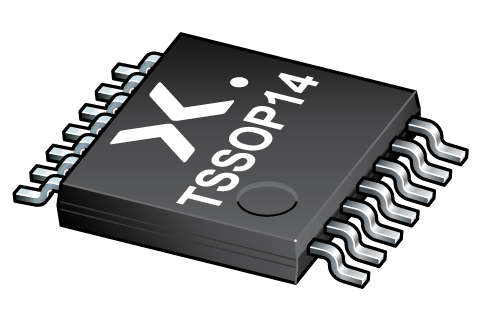Orderable parts
| Type number | Orderable part number | Ordering code (12NC) | Package | Buy from distributors |
|---|---|---|---|---|
| 74AHCT14PW | 74AHCT14PW,118 | 935262761118 | SOT402-1 | Order product |

Register once, drag and drop ECAD models into your CAD tool and speed up your design.
Click here for more informationHex inverting Schmitt trigger
The 74AHC14; 74AHCT14 is a hex inverter with Schmitt-trigger inputs. Inputs are overvoltage tolerant. This feature allows the use of these devices as translators in mixed voltage environments.
Wide supply voltage range from 2.0 V to 5.5 V
Overvoltage tolerant inputs to 5.5 V
High noise immunity
CMOS low power dissipation
Balanced propagation delays
Input levels:
For 74AHC14: CMOS level
For 74AHCT14: TTL level
Latch-up performance exceeds 100 mA per JESD 78 Class II Level A
ESD protection:
HBM: ANSI/ESDA/JEDEC JS-001 class 2 exceeds 2000 V
CDM: ANSI/ESDA/JEDEC JS-002 class C3 exceeds 1000 V
Multiple package options
Specified from -40 °C to +85 °C and from -40 °C to +125 °C
| Type number | VCC (V) | Logic switching levels | Output drive capability (mA) | fmax (MHz) | Nr of bits | Power dissipation considerations | Tamb (°C) | Rth(j-a) (K/W) | Ψth(j-top) (K/W) | Rth(j-c) (K/W) | Package name |
|---|---|---|---|---|---|---|---|---|---|---|---|
| 74AHCT14PW | 4.5 - 5.5 | TTL | ± 8 | 60 | 6 | low | -40~125 | 141 | 8.2 | 67.2 | TSSOP14 |
| Model Name | Description |
|---|---|
|
|
| Type number | Orderable part number, (Ordering code (12NC)) | Status | Marking | Package | Package information | Reflow-/Wave soldering | Packing |
|---|---|---|---|---|---|---|---|
| 74AHCT14PW | 74AHCT14PW,118 (935262761118) |
Active | AHCT14 |

TSSOP14 (SOT402-1) |
SOT402-1 |
SSOP-TSSOP-VSO-WAVE
|
SOT402-1_118 |
All type numbers in the table below are discontinued.
| Type number | Orderable part number, (Ordering code (12NC)) | Status | Marking | Package | Package information | Reflow-/Wave soldering | Packing |
|---|---|---|---|---|---|---|---|
| 74AHCT14PW | 74AHCT14PW,112 (935262761112) |
Withdrawn / End-of-life | AHCT14 |

TSSOP14 (SOT402-1) |
SOT402-1 |
SSOP-TSSOP-VSO-WAVE
|
Not available |
| Type number | Orderable part number | Chemical content | RoHS | RHF-indicator |
|---|---|---|---|---|
| 74AHCT14PW | 74AHCT14PW,118 | 74AHCT14PW |
|
|
All type numbers in the table below are discontinued.
| Type number | Orderable part number | Chemical content | RoHS | RHF-indicator |
|---|---|---|---|---|
| 74AHCT14PW | 74AHCT14PW,112 | 74AHCT14PW |
|
|
| File name | Title | Type | Date |
|---|---|---|---|
| 74AHC_AHCT14 | Hex inverting Schmitt trigger | Data sheet | 2025-04-29 |
| AN11106 | Pin FMEA for AHC/AHCT family | Application note | 2019-01-09 |
| AN90063 | Questions about package outline drawings | Application note | 2025-10-22 |
| SOT402-1 | 3D model for products with SOT402-1 package | Design support | 2023-02-02 |
| ahct14 | ahct14 IBIS model | IBIS model | 2013-04-08 |
| Nexperia_package_poster | Nexperia package poster | Leaflet | 2020-05-15 |
| TSSOP14_SOT402-1_mk | plastic, thin shrink small outline package; 14 leads; 0.65 mm pitch; 5 mm x 4.4 mm x 1.1 mm body | Marcom graphics | 2017-01-28 |
| SOT402-1 | plastic, thin shrink small outline package; 14 leads; 0.65 mm pitch; 5 mm x 4.4 mm x 1.2 mm body | Package information | 2023-11-07 |
| SOT402-1_118 | TSSOP14; Reel pack for SMD, 13"; Q1/T1 product orientation | Packing information | 2025-01-16 |
| 74AHCT14PW_Nexperia_Product_Reliability | 74AHCT14PW Nexperia Product Reliability | Quality document | 2025-03-20 |
| SSOP-TSSOP-VSO-WAVE | Footprint for wave soldering | Wave soldering | 2009-10-08 |
If you are in need of design/technical support, let us know and fill in the answer form we'll get back to you shortly.
The Nexperia Longevity Program is aimed to provide our customers information from time to time about the expected time that our products can be ordered. The NLP is reviewed and updated regularly by our Executive Management Team. View our longevity program here.
| Model Name | Description |
|---|---|
|
|
| Type number | Orderable part number | Ordering code (12NC) | Status | Packing | Packing Quantity | Buy online |
|---|---|---|---|---|---|---|
| 74AHCT14PW | 74AHCT14PW,118 | 935262761118 | Active | SOT402-1_118 | 2,500 |
|
As a Nexperia customer you can order samples via our sales organization.
If you do not have a direct account with Nexperia our network of global and regional distributors is available and equipped to support you with Nexperia samples. Check out the list of official distributors.
The interactive datasheets are based on the Nexperia MOSFET precision electrothermal models. With our interactive datasheets you can simply specify your own conditions interactively. Start by changing the values of the conditions. You can do this by using the sliders in the condition fields. By dragging the sliders you will see how the MOSFET will perform at the new conditions set.